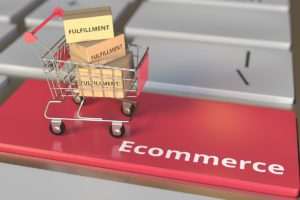In the wake of the pandemic, consumers became increasingly dependent on the digital world. Due to ever-growing market conditions and industry development, e-commerce businesses were forced to advance rapidly. Moreover, security measures, trust, and efficiency were major challenges being faced by the e-commerce industry.
The growing market scenario and prevalent challenges can be addressed by implementing blockchain technology into your eCommerce and eCommerce fulfilment business. It offers:
- Decentralisation,
- Immutability,
- Authentic transactions,
- Traceability,
- and scalable customer service.
All can be enabled, which can facilitate advanced digital transformation.
Blockchain and its Purpose
As a database, blockchains are chains of blocks of information linked together. The result is a system that is trusted and error-free. Since the database is managed and shared by more than one person, irregularities are easy to spot.
E-commerce recognises blockchain technology’s potential, although it has long been associated with bitcoin transactions.
Blockchain’s general advantages:
- The blockchain is a consensus-based system that builds trust without depending on one central authority.
- This creates a more transparent environment.
- Consumers can connect directly with each other and companies without relying on middlemen. As a result of this peer-to-peer connection, the users have a lot of power.
Blockchain and its Future Impact on Ecommerce
Vendors and manufacturers must be more customer-oriented in the age of blockchain technology and its empowerment for consumers. For this to happen, it is necessary to gain a better understanding of what customers want and what they expect.
This can be achieved by enabling merchants and consumers to collaborate via a blockchain-based platform.
The middlemen, however, are at risk because, eventually, technology will make them obsolete, and they will no longer serve a purpose. It is particularly important for companies that cannot prove how their service adds value to the customer to bear this in mind.
There will be an in-depth look at how blockchain can help shape the future of eCommerce in the coming years and how they can provide the best blockchain development services to the eCommerce industry.
Retailers’ loyalty programs and personal offers
As a customer, wouldn’t it be wonderful if multiple supermarket brands could share their shopping history with you, and you could receive personalised offers from them? Moreover, how about loyalty programs that you can use across various retailers to choose where you want to redeem your reward?
Blockchain technology enables both examples, where your purchase history and points are securely captured on the blockchain, and you own and distribute them to the companies of your choice.
Monitoring & tracking the supply chain more effectively.
It is a distant dream for eCommerce businesses to have a supply chain that is well-monitored and balanced at all times. Tracking the products, managing the stock, and centralising the database is the most crucial aspect of e-stores and eCommerce fulfilment services.
That’s where Blockchain can be helpful for eCommerce if they want to track and monitor their products and improve their system’s overall management.
For example, the provenance of the products must be tracked thoroughly to determine when they will expire or when they should be used.
In conjunction with blockchain technology, the RFID tags and the embedded sensors allow businesses to conduct provenance tracking to keep track of the products they manufacture. If you know the date of production of the product, you will be able to trace it back to its origin.
Cost-savings
Blockchain in eCommerce reduces costs by providing a single system for multiple processes like product descriptions, inventory management, payment transactions, etc. This is one of the benefits of blockchain for eCommerce fulfillment businesses.
With this system, companies would be able to identify which stock of products is causing any issues and locate them easily. The blockchain network updates in real-time, so no matter what party is connected to it, they will be able to identify the point where a product becomes unsafe after entering the supply chain.
This way, you can increase productivity as far as goods and products are concerned. With the system being fully decentralised, you will not be required to pay any fees or commissions.
Network receipts and warranties
The receipts and warranty cards used to be sent with the products purchased on e-commerce websites. Eventually, online messaging became popular, and sharing information was made easy through platforms like email. The technology of blockchain, however, has taken it to a whole new level of sophistication.
All receipts and warranty details can be stored online in a cryptographic data block, commonly known as a node, which is a type of computer storage. The bills are accessible from the retailer’s network so that users can access them conveniently.
The process of filing claims and obtaining warranties could be simplified for buyers. Furthermore, the blockchain system can be useful for verifying proof of ownership if false claims exist.
Authentic reviews
Researchers have shown that people still hesitate to shop online for a number of reasons. There is no way that the customer can trust the details of the product they are buying since they do not know the seller personally; the only thing they can see is the ratings and reviews of the product they are buying.
Also, customers are not sure if the feedback they receive is authentic or whether it is fake. The customer is supposed to receive feedback even before they have received the product that has been ordered.
There is an urgent need for this type of technology since it can reduce the risk, allow for an increase in trust, and does not require any form of central authority. Every transaction in the blockchain needs to be validated before being processed, eliminating the possibility of fake entries or fraud.
By recording whether the reviewer has purchased from the website or not, the blockchain in eCommerce can verify if the review is genuine by verifying whether or not the reviewer has purchased from the website.
Operational efficiency
Data verification is ensured by blockchain, a decentralised system that is secure and distributed. Streamlining the work processes and bringing efficiency to the system is a transformational step.
Using blockchain technology, E-commerce companies can better track their daily transactions, production levels, employees, latest market trends, and emerging competitors. An ever-changing economy requires the smooth functioning of the industry.
How does blockchain benefit eCommerce businesses?
Blockchain enables consumers, manufacturers, creators, suppliers, and vendors better to understand their customers and vendors through blockchain technology.
Blockchain also poses a risk to middlemen. The companies that provide mediator services in a blockchain world will have to evaluate how much they increase their clients’ collaboration value.
Those looking to become successful in eCommerce should begin learning about blockchain technology. Not only will you be able to rethink how you work, but you’ll also be able to find a one-time agreement that you can adhere to within the same time frame.
The blockchain will make your business more efficient through total control over the supply chain and eCommerce order fulfilment. By doing so, the blockchain reduces the cost of the entire process.
The blockchain facilitates automated customer, seller, and client interaction through coded instructions. Business-to-business and business-to-consumer applications are compatible with blockchain technology.
Moreover, eCommerce is the world’s biggest B2C and B2B industry and needs to be transformed using blockchain technology. According to most businesses, Blockchain can also increase customer satisfaction in more ways than just sales.
The future of e-commerce depends on the advancement of blockchain technology and how its applications are used to accelerate exponential growth.
How is crypto changing eCommerce?
- Cryptocurrencies such as Bitcoin, Ethereum, and Ripple are currently available. Cryptocurrencies are now replacing traditional currencies because of their decentralised nature. These are some lucrative advantages.
- The seller and buyer control buying and selling since the technology are decentralised. A third party cannot manipulate the transactions. Therefore, there can be no devaluation or inflation of currencies.
- The identities of the parties are also not revealed when using cryptocurrencies. A centralised ledger keeps track of all transactions and transparent details.
- Blockchains are different. Banks and other institutions control the number of transactions and spending limits for traditional transactions. The party is not accountable to any governing body regarding how bitcoins are utilised.
- A cryptocurrency account can be set up at your home without the help of any intermediaries and is easy to use.
- Financial transactions based on blockchain take a fraction of the time as compared to traditional transactions. Bitcoin transactions can also be carried out at any time, unlike banks closed at certain times.
- Due to its decentralised, secure nature, it is difficult to hack it to commit fraud.
Conclusion
Blockchain remains a relatively new technology, and its application in e-commerce is relatively recent. Blockchain’s advantages make it an important investment to look into its possibilities before it’s too late. Starting with low-risk experiments is the best way to develop an entrepreneurial mindset.
By combining blockchain and e-commerce, new business opportunities can be found that promote transparency, trust, and cost reduction. Organisations that cannot provide value to their customers can also suffer from the effects of digital disruption. E-commerce organisations should explore all the opportunities that blockchain offers if they want to stay relevant in the future.









